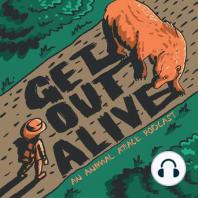39 min listen
Ep. 35: Steve Irwin
ratings:
Length:
41 minutes
Released:
Sep 14, 2022
Format:
Podcast episode
Description
On September 4th, 2006, the world's most famous conservationist, Steve Irwin, went out on the ocean to shoot a documentary called Ocean's Deadliest. No one could've anticipated that he'd be killed by an animal that wasn't even on the Ocean's Deadliest list.Steve was beloved by the world for his passion for wild animals of all kinds, especially crocodiles. So many of us grew up watching Crocodile Hunter and were inspired to work with animals (Ashley included). So what happened on that day in 2006 that led to his death? Should we be worried about stingrays? Tune in to hear how we can all recreate around stingrays safely.November 15th is Steve Irwin Day. You can learn more about his zoo and Wildlife Warriors at australiazoo.com.auWE HAVE NEW MERCH! Support the show by shopping at www.getoutalivepodcast.com/shopFollow us on Instagram, Facebook, (finally) Tiktok and check out our website GetOutAlivePodcast.com and join us on Patreon!You can find Ashley @TheAngryOlogist on Twitter and Nick will respond to people on social media but still maintains that he does not have social media.Disclaimer: This is not professional advice; Follow at your own risk.Support the show
Released:
Sep 14, 2022
Format:
Podcast episode
Titles in the series (79)
Ep. 9: When Beavers Attack by Get Out Alive: An Animal Attack Podcast
